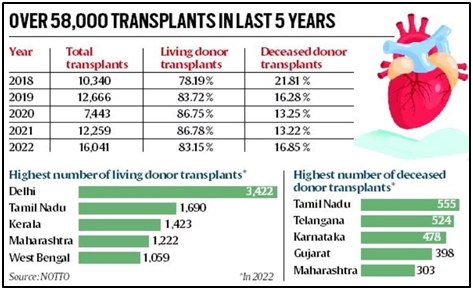Four out of five organ recipients in country are men: NOTTO data
15-11-2023
10:46 AM

What’s in today’s article?
- Why in news?
- What is National Organ and Tissue Transplant Organisation (NOTTO)?
- What are the regulatory frameworks guiding the organ transplantation in India?
- News Summary: Four out of five organ recipients in country are men - NOTTO data
- Key highlights of the study by NOTTO
- Organ transplantation in India – Statistics

Why in news?
- Four out of five organ recipients in India between 1995 and 2021 were men, according to data collated by the National Organ and Tissue Transplant Organisation (NOTTO).
- These numbers indicate the prevailing gender disparity among those seeking healthcare.
National Organ and Tissue Transplant Organisation (NOTTO)
- NOTTO is a national level organization set up under Directorate General of Health Services, Ministry of Health and Family Welfare.
- It functions as apex centre for all India activities of coordination and networking for:
- procurement and distribution of organs and tissues; and
- registry of Organs and Tissues Donation and Transplantation in country.
Regulatory frameworks guiding the organ transplantation in India
- Legislation
- In 1994, The Transplantation of Human Organs Act (THOA) was promulgated by the government of India.
- The Transplantation of Human Organs Rules were last amended in 2014, increasing the scope of donation and including tissues for transplantation.
- The act made commercialization of organs a punishable offence and legalized the concept of brain death in India allowing deceased donation by obtaining organs from brain stem dead person.
- Institution
- NOTTO besides laying down policy guidelines and protocols for various functions, it coordinates all the activities associated with organ donation at national level.
- Organ transplant rules
- In February 2023 the govt modified national organ transplantation guidelines.
- The new guidelines have done away with the 65-year age limit for registration of patients seeking organs from a deceased donor.
- There was no age cap for living donor transplants, where family members donate organs like kidneys and livers.
- However, people over the age of 65 years couldn’t register to receive organs from deceased donors as per guidelines of NOTTO.
- It has asked states to remove the domicile criterion for registering those seeking organs from deceased donor for transplant procedures.
- Now the needy person can go to any state of the country and register for getting organ and also get the transplant done.
- The patient will be allotted a unique ID by NOTTO on registering.
- This will get carried forward even if the patient changes multiple hospitals in different States.
- Noting that some states have been charging fees ranging between Rs 5,000 to 10,000 for registering such patients, this guideline has asked them not to charge money.
News Summary: Four out of five organ recipients in country are men - NOTTO data
- Data from 1995 to 2021 shows 36,640 transplantations were carried out, of which over 29,000 were for men and 6,945 were for women.
- This means, for every woman who received an organ, four men got transplants.
- The stark difference was because of economic and financial responsibilities, societal pressures and ingrained preferences.
Key highlights of the study by NOTTO
- Gender disparity in living organ transplantation
- More men are cadaver donors but more women are living donors.
- The data analysed found that 80% of the living organ donors are women, mainly the wife or the mother while 80% of the recipients are men
- Reasons for more women donors
- Financial responsibilities on the male members and cultural upbringing wherein a woman is taught to take care of her family (caretakers and givers) is the cause why more women tend to donate while more men are likely to be recipients.
- As men are the bread winners in most cases, they hesitate from undergoing any surgery.
- Women who are recipients feel guilty if their family members have to donate their organs and they refuse to take them from their families.
Organ transplantation in India – Statistics
- According to the NOTTO data, there has been an overall increase in the number of transplants in the country, with a record high of 16,041 such procedures in 2022.
- India has an organ donation rate of about 0.52 per million population.
- In comparison, the organ donation rate in Spain, the highest in the world, is 49.6 per million population.
Q1) What is organ donation?
Organ donation is the process of surgically removing an organ or tissue from one person (the organ donor) and placing it into another person (the recipient). Transplantation is necessary because the recipient’s organ has failed or has been damaged by disease or injury.
Q2) What is the Transplantation of Human Organs Act, 1994?
The Transplantation of Human Organs Act, 1994 was enacted by the Parliament during 1994. The main purpose of the Act is to regulate the removal, storage and transplantation of human organs for therapeutic purposes and to prevent commercial dealings in human organs.
Source: Four out of five organ recipients in country are men: NOTTO data | National Organ and Tissue Transplant Organisation | DIRECTORATE GENERAL OF HEALTH SERVICES | Times of India


